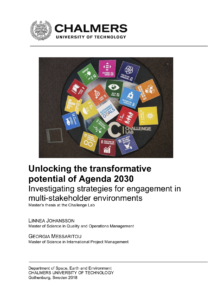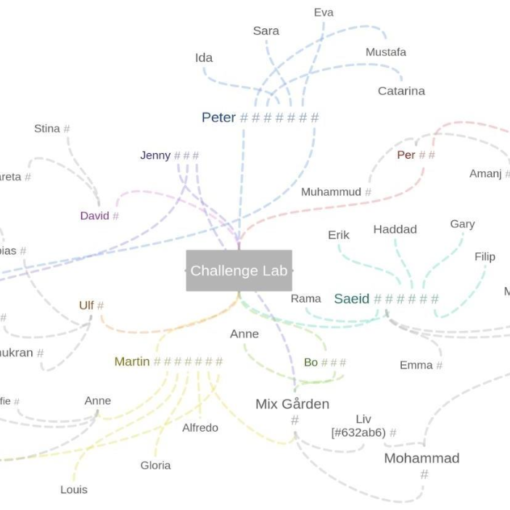LINNEA JOHANSSON & GEORGIA MESSARITOU (2018)

To address the sustainability challenge outlined in the United Nations document Transforming our world: the 2030 Agenda for Sustainable Development within the given time-frame is by many perceived as a difficult, yet urgent and necessary task. Such a task requires incremental change to be complemented by processes of societal transformation, and such transformation requires multi-stakeholder engagement. The work presented here takes its starting point in West Sweden, where indications point towards low engagement with the Agenda among organisations and an uncertainty regarding the implications of the transformative nature of the Agenda. This thesis therefore seeks to engage with the following research question: How might the transformative potential of Agenda 2030 be unlocked in a multi-stakeholder environment? To answer this question, a Transformation lens as an analytical framework was created to help identify elements suppressing or supporting transformation. Additionally, interview data on current engagement with, and attitudes towards Agenda 2030 was collected from representatives from organisations in West Sweden and analysed by thematic mapping. In parallel, a document analysis based on the Transformation lens helped identify transformative elements in existing recommendations regarding engagement with the Agenda. The Transformation lens highlighted elements such as the need for a vision of sustainability, settings for learning and experimentation and transformation of the current socio-technical system, all while ensuring engagement from diverse stakeholders. With that said, the most common current engagement with the agenda does not challenge the current system. However, potentially more transformative ways to engage were described both by academics in interviews, and in documents. This shows a gap between current practices and existing recommendations. Additionally, the interviews and documents did not problematise the same things. For example, resistance to change was a rather central topic in the interviews but not at all addressed in the documents. Based on the identified elements and the gaps, we created a set of recommendations on how to work more transformatively with the Agenda in multi-stakeholder environments. The main aspect in these recommendations is to ensure time and space for reflections, both individually and in groups within organisations as well as across multiple organisations. Topics to reflect upon are what is the desired vision for sustainability, what the next step could be in realising that vision, and what roles different actors have and what the interaction between them should be. Additionally, reflection upon how safe spaces for continuous learning and experimentation could be created to complement moremainstream activities in today’s organisations. This set of recommendations may provideinitial stepping stones to help organisations engage with Agenda 2030 in a way which transforms not only themselves, but also have positive impact in the networks in which they operate.





